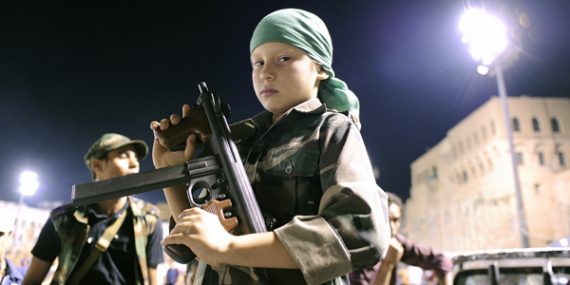Libya After Gaddafi: Lessons From Iraq
The Atlantic has published an essay I wrote yesterday morning titled "Libya After Qaddafi: Lessons from Iraq 2003."
The Atlantic has published an essay I wrote yesterday morning titled “Libya After Qaddafi: Lessons from Iraq 2003.” An excerpt:
Who can forget the giddiness when Saddam’s statue fell? When sons Qusay and Uday were killed? When Saddam himself was dragged out of his spider hole? Or the smiling faces of the purple-fingered Iraqis voting in their country’s first meaningful elections?
Before President Obama slips into a flight suit, it’s worth remembering that things soon took a turn for the worse in Iraq and it would be years before that fight began to calm.
That’s not to predict, much less hope for, a repeat in Libya. Despite Americans’ love of historical analogies in framing foreign events, they seldom follow neat patterns.
[…]
While the revolutionaries were united against Qadaffi, it’s far from clear what, if anything, they’re united for. And with their unifying enemy on his way out, they’ll need something more to bring them together to rule.
How will reconciliation with former regime elements be handled? How quickly will law and order be established? Will international peacekeepers be necessary? If so, how will such a force be organized and manned? When will elections be held and who will be allowed to participate? What form of government will be established in the interim? These are just a handful of the questions most immediately facing Libya.
Daunting though these questions might be, there’s at least one good reason to be optimistic that Qaddafi’s fall will not be like Saddam’s: the latter debacle is fresh on everyone’s minds. While NATO appears to have done scant planning for post-Qaddafi Libya, the Transitional National Council and others, including the UK government, have shown encouraging signs that they aim to avoid the mistakes of 2003.
Much more at the link.







“Best Christmas Evar!”
Oh, this isn’t a caption contest.
I think a number of people are celebrating well before the party. I tend to be a suspicious person, and it seems possible Ghaddafiya’s “defeat” is not yet a reality. Hearing how comparatively easily the capitol fell I can’t help but think it may have been by design so that rebel forces could be entrapped.
That picture… There is nothing scarier, or more dangerous, than a child with a gun.
Let us hope they do. Of course they will make a whole slew of new mistakes.
The more proper analogy tho, might be Afghanistan where most of the fighting was done by the Northern Alliance..
Isn’t Egypt the obvious parallel?
I’ll be Captain Obvious for a moment: there is no exact parallel. Iraq, Afghanistan, Egypt and Libya are all different.
I hope thinks work out ok. I don’t expect them to. If they do, I’ll be pleasantly surprised. YMMV.
@Rob in CT:
I’m just thinking that Libyans must see themselves in some degree relative to their neighbors, and that the revolution next door must have been in some sense model for them. Certainly more than oil-less, culturally isolated, Afghan tribesmen.
I don’t think there’s much more that can be said other than “We’ll see”. I doubt that Qaddafi has a retirement plan and he’s had a lot of time to prepare to conduct an insurgency. To what degree is he completely without supporters? I don’t think anybody really knows.
I will be a bit surprised if Qaddafi leaves real supporters behind who are willing to conduct an insurgency. Modern insurgencies seem to be ideologically driven or between ethnic/religious groups. Not sure that Mr. Fashion Plate evokes passionate support, but guess we will find out. I would be more concerned about the different factions fighting each other, rather than fighting for Qaddafi.
Steve